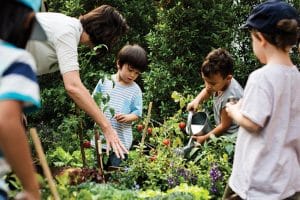
“It’s our polite nudge in the ribs to help you and your team stay organised and on task.”
This week’s subject is Community engagement.
Element 6.2.3: The service builds relationships and engages with its community.
What practices does your service implement to foster meaningful community engagement, broadening children’s knowledge and understanding of and connection to the world they live in and contribute to?
Embedding consistent and meaningful community engagement in service practices supports children develop a sense of belonging and identity, fostering social and emotional development and competence. When services actively engage communities, children benefit through diverse learning opportunities and an enriched educational program that extends their knowledge and understanding of diversity, inclusion, and the world in which they live.
Services strengthen their community engagement by refining practices to include Aboriginal and Torres Strait Islander perspectives, which is key to reconciliation and equity. This involves moving beyond superficial or tokenistic acknowledgments to deeper, more meaningful, respectful integration. Services can achieve this by forming genuine partnerships with Indigenous communities, such as inviting cultural advisors or Elders to inform curriculum, practices or development of a Reconciliation Action Plan (RAP). Incorporate elements like yarning circles for sharing stories or land-based learning that respects Country. Culturally sensitive practices ensure activities are approved by community members, fostering trust and authenticity.
Services should reflect on what practices are currently being implemented to strengthen community connections and involvement and discuss ways in which the Service can improve.
Consider how your Service can engage in new and meaningful ways to connect with the local community by implementing some of the following practices:
-
- build reciprocal relationships within the community. Start by mapping your local community and initiating partnerships, like inviting guest speakers from local/community groups or co-hosting events with neighbouring ECEC Services.
- connecting with, promoting, partnering with and visiting local businesses
- partnering with local businesses, such as restaurants, grocery stores, or toy stores, for sponsorships, donations and discounts for families/the Service
- providing opportunities for community members, including parents, retirees, or high school students, to volunteer at the Service to assist with activities, events, excursions or projects
- establishing parent advisory committees or councils to provide feedback, suggestions, and input on the Service’s operations, programs, policies, and practices to foster collaboration and parent/community involvement
- build on or establish relationships with local schools; arrange transition to school visits and other joint initiatives, such as literacy programs, storytelling sessions, or workshops
- develop a travel training program for year 6 students transitioning to High School (School age care)
- foster your Service’s relationship with local aged care facilities by implementing a number of initiatives to strengthen the connection (pen pal program, framing and gifting children’s artworks, organising a talent show to perform during a visit etc.)
- frequent visits to the local library.
- creating or contributing to a street library.
- create a community engagement newsletter to share your Service’s community involvement with families and relevant stakeholders and request feedback/ suggestions
- create a community garden or arrange visits to your local community garden
- create a “Pantry for the People” to be set up at a location within your local community and encourage donations from families. Take children on regular visits to the Pantry to restock and maintain.
- organise a raffle to raise funds for stock for “Pantry for the People” or to donate to local community organisations in need. Request donations from local businesses such as items to make up hampers, vouchers from local hairdressers/beauty salons, dance lessons or other extracurricular activities, car maintenance services (mechanic, auto electrics, car wash/detailing) etc. Sell raffle tickets within your Service and the local community.
- connect with your local Aboriginal Education Consultative Group (AECG) to seek advice and support around the development of an age-appropriate Acknowledgement of Country for your service.
- collaborate with local Aboriginal communities, organisations, or Elders to facilitate cultural responsiveness. Invite guest speakers, arrange trips to cultural sites, or participate in community events to strengthen connections with Indigenous communities.
- continuously reflect on and evaluate the effectiveness of Aboriginal perspectives in the program. Seek feedback from staff, families, and community members to identify areas for improvement and ensure that cultural teachings are respectful, authentic and meaningful.
- create a “Community Information” board at your Service and continually update with local events, opportunities, resources and relevant news and information.
- support your local businesses by advertising their business/products/services in your Newsletter or Community Information board.
- Implement the “Eight Ways of learning” into the pedagogy of your Service
- develop a Reconciliation Action Plan (RAP)
- Attend and participate in school events and activities (School age care)
Resources:
Belonging, Being & Becoming- Aboriginal and Torres Strait Islander perspectives
Establish and Maintain Community Links
Build Relationships with Community
Beginner Tips for Connecting with Community
Reconciliation Australia:
Within System7 go to Quality Area 6/ Module 25 to submit self-assessment notes and if required, open a QIP issue if you identify any areas of improvement.
The Childcare Centre Desktop has a range of resources to assist services with physical environment. These include risk assessment and safety check templates and much more.
Resources, NQS Element, Regulation and System7 links:
Childcare Centre Desktop – Childcare Centre Desktop
National Quality Standard – QA 6/ 6.2.3- Community Engagement
National Regulations – 73
System7 Module – QA6 / Module 25
If you have any questions, send us a note via the Contact page here!




